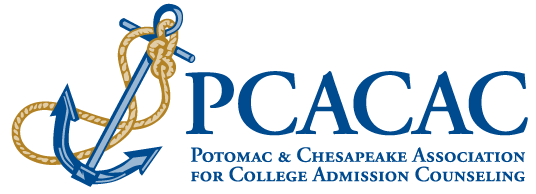Dear friends and colleagues,
We made it to graduation season! Given the bizarre craziness of this year, I'm sure many of us were wondering if we would make it to the finish line in one piece. I know I had a quite a few moments when I questioned that! Yet, here we are - another year in the books, with our seniors graduating and another freshman class ready to arrive soon. The circle of life in college admission continues...
...and so it does in PCACAC as well. Just as we finished up our 52nd Annual Conference a month ago, we dove straight into planning for the next year. Wait...you were at the conference, right? If you weren't, you missed a great one. We had a fantastic slate of dynamic sessions, one of the best line-ups I've seen, including many new topics and new approaches to perennial issues. I want to thank everyone involved with putting on such an outstanding conference, including Rosemary Martin (Conference Planning Chair), Robyn Lady (President-Elect and Sessions Chair), and Annie Hilten (PCACAC's devoted and hard-working Executive Assistant). With the conference behind us, we're already getting ready for our Summer Institute this July at Roanoke College. And save the date for next year's Annual Conference in Dover, Delaware!
We also elected new officers at the Conference. Please join me in congratulating our new PCACAC leaders:
- President-Elect: Jake Talmage, St. Paul's School for Boys (MD)
- Secretary: Heather Jeter, The Steward School (VA)
- Delegate and Government Relations Chair: Ginger Miller, Landon School (MD)
- Delegate and Professional Development Chair: Rebekah LaPlante, Virginia Tech (VA)
- Delegate (at large): Sanjay Mitchell, Thurgood Marshall Academy PCS (DC)
 Finally, as my last few weeks as President of PCACAC wind down, allow me a moment to express my gratitude and thanks to all of you. It has been an honor and privilege for me to serve as President this year for an organization that has meant so much to me for nearly 20 years. I've greatly enjoyed working closely with so many of you, and I look forward to continuing to do so as I transition to the role of Past President. Not only am I finishing my stint as President of PCACAC, but I am also leaving my home of 16 years at Randolph-Macon College for a new position as Co-Director of College Counseling at St. Catherine's School in Richmond. I appreciate the support of my friends and colleagues at R-MC; while I'll miss them greatly, I look forward to an exciting new chapter to begin this summer.
Finally, as my last few weeks as President of PCACAC wind down, allow me a moment to express my gratitude and thanks to all of you. It has been an honor and privilege for me to serve as President this year for an organization that has meant so much to me for nearly 20 years. I've greatly enjoyed working closely with so many of you, and I look forward to continuing to do so as I transition to the role of Past President. Not only am I finishing my stint as President of PCACAC, but I am also leaving my home of 16 years at Randolph-Macon College for a new position as Co-Director of College Counseling at St. Catherine's School in Richmond. I appreciate the support of my friends and colleagues at R-MC; while I'll miss them greatly, I look forward to an exciting new chapter to begin this summer.
Again, thank you for all that you have done to support me this past year and for all that you do for PCACAC every year. Have a wonderful summer!
Anthony Ambrogi
President, Potomac & Chesapeake Association for College Admission Counseling
Director of Admissions and Enrollment Research, Randolph-Macon College
President, Potomac & Chesapeake Association for College Admission Counseling
Director of Admissions and Enrollment Research, Randolph-Macon College



